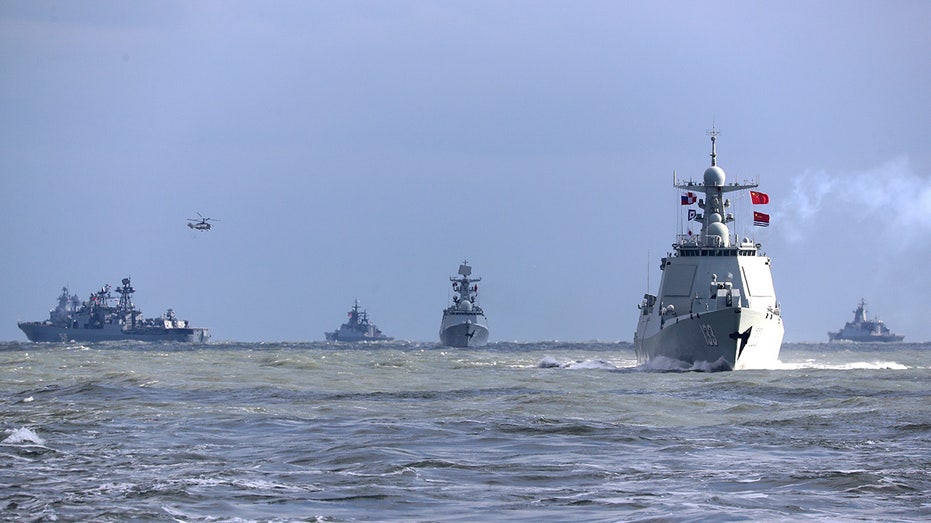Russia, China hold biggest war games since Soviet era
Russia and China in midst of the largest war games since the Soviet era with some 90,000 troops engaged in joint drills as the U.S. warns Beijing has provided Moscow with "substantial" war aid.

Russia and China this week engaged in the largest military drills in some 30 years after they launched joint naval and air exercises spanning both hemispheres on Tuesday, a report by Reuters confirmed.
The Russian defense ministry said the week-long war games will include 90,000 troops, 400 warships, submarines and support vessels, along with 120 planes and helicopters spread across the Pacific and Arctic Oceans, and the Mediterranean, Caspian and Baltic Seas.
The exercises, dubbed "Ocean 24," coincided with meetings in Brussels between the U.S. and the European Union in which the issue of security in the Indo-Pacific, as well as China’s support for Russia amid the war in Ukraine, were addressed.
US MUST EXPAND NUCLEAR ARSENAL IN FACE OF RUSSIA AND CHINA THREAT, WARNS TOP OBAMA DEFENSE ADVISER
The U.S. accused Beijing of crossing a line and providing "very substantial" support to Russia after more than two and half years of war and sanctions that are said to have begun taking a toll on its military stockpiles.
"These are not dual-use capabilities," U.S. Deputy Secretary of State Kurt Campbell told reporters, according to Politico EU, in reference to the latest material supplies China provided Russia. "These are basically being applied directly to the Russian war machine."
"These are component pieces of a very substantial effort on the part of China to help sustain, build and diversify various elements of the Russian war machine," he added. "We're seeing efforts at the highest levels of both governments to try to both hide and protect certain elements of this worrisome collaboration.
"Most of these activities have been driven underground," Campbell warned.
A statement by the State Department following the U.S.-EU meeting accused China of helping Russia to evade sanctions and called on Beijing to "act in support of international law" – including in its attempts to push through any peace proposals.
UKRAINE'S FATAL F-16 CRASH SHOULD SCARE RUSSIA AND CHINA
China has repeatedly denied its involvement in Russia’s illegal war in Ukraine and has pushed for a peace deal to end the conflict.
But a six-part peace proposal put forward by China and Brazil in May was unequivocally rejected by Ukrainian President Volodymyr Zelenskyy, who told Brazilian news outlet Metropoles on Thursday that the plan lacked respect for Ukraine’s territorial integrity.
"You either support the war, or you don't support the war. If you don't support it, then help us stop Russia," he said, according to a report by the Kyiv Independent.
"Just give up our land, forget that they are killing our people? What is the compromise in that?" he questioned. "That's why I think it's destructive. It's just a political statement."
Russian President Vladimir Putin said last week he was once again open to the idea of engaging in peace talks with Ukraine so long as a nation like China, Brazil or India acted as a mediator – a condition Zelenskyy is unlikely to agree on given Moscow's ties to both Brazil and China.
Moscow and Beijing have become increasingly united against the U.S. and its Western allies following the invasion of Ukraine, which solidified geopolitical divisions between authoritarian leaders and democratic nations.
But it is not only China that has been aiding Russia in an effort to boost the burgeoning alliance.
Campbell on Tuesday reportedly said Moscow has also begun sharing some of its closely guarded military secrets by giving China access to submarine, missile and other sensitive technologies.
"The capabilities that Russia is providing is support in areas where previously they had been frankly reluctant to engage directly with China," Campbell said. "We are concerned about a particular number of military arenas where there appears to be some determination to provide China with greater support."
U.S. officials have warned that China will pose an even greater threat in the Indo-Pacific and to nations like Japan and South Korea in the East China Sea should it "receive greater engagement from Russia in perfecting certain military capabilities."



